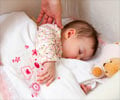Nearly 70% of parents of children with ADHD report that the children have difficulty falling asleep and that they spend a long time putting them to bed.

‘Two out of three children with ADHD have one or more additional psychiatric diagnoses in addition to ADHD, which probably increases the risk of sleep disturbance.’





"Our study will confirm what many parents have experienced, which is that children with ADHD take longer to fall asleep at night. With our measurements we can also see that these children experience more disturbed sleep including less deep sleep. If you only look at length of sleep, children in the ADHD group sleep for 45 minutes less than children in the control group," says PhD from Aarhus University and medical doctor at the Child and Adolescent Psychiatric Hospital, Risskov, Anne Virring Sørensen, who is behind the PhD study. Two out of three children with ADHD have one or more additional psychiatric diagnoses in addition to ADHD, which probably increases the risk of sleep disturbance. But even when the researchers look at the children who have only been diagnosed with ADHD, they see a big difference in the sleep patterns of the control group and the ADHD group.
Opposite sleep patterns during the day
The researchers also studied sleep patterns during the day. The findings surprised the researchers.
"Unlike in the evening we could see that there was a tendency for the children with ADHD to fall asleep faster during the day than the children in the control group. This is somewhat surprising when you take into account that ADHD is associated with characteristics such as hyperactivity. But this hyperactivity could be compensatory behaviour for not being able to doze off during the day" says Anne Virring Sørensen.
Advertisement
"In our study the children had electrodes attached to their heads for what is known as a polysomnography at the hospital in the afternoon, but they slept in their familiar home surroundings. In previous studies children have been admitted to specialist sleep centres at hospital to measure sleep via a polysomnographic study," says Anne Virring Sørensen.
Advertisement
Important study
She believes that the study is important in both the short and long term:
"I think many parents and clinicians are very pleased to receive confirmation that poor sleep patterns can now be demonstrated and that there is probably a correlation with the ADHD diagnosis. The next step is, of course, to find out where this correlation lies so we can develop better treatments in the long term. Our survey is an important foundation for further studies," she says.
Source-Newswise















